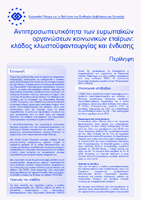| dc.contributor.author | Sanz de Miguel, Pablo |
| dc.date.accessioned | 2014-09-03T05:30:52Z |
| dc.date.available | 2014-09-03T05:30:52Z |
| dc.date.issued | 2013-11-16 |
| dc.identifier.uri | https://ketlib.lib.unipi.gr/xmlui/handle/ket/967 |
| dc.description.abstract | This study provides information designed to aid sectoral social dialogue in the textile and clothing sector. The study is divided into three parts: a summary of the sector’s economic background; an analysis of the social partner organisations in all the EU Member States, including their membership, role in collective bargaining, social dialogue and public policy, and national and European affiliations; and an analysis of relevant European organisations, particularly their membership composition and capacity to negotiate. The aim of EIRO studies on representativeness is to identify the relevant national and supranational social partner organisations in the field of industrial relations in selected sectors. The impetus for these studies comes from the European Commission’s desire to recognise the representative social partner organisations to be consulted under the provisions of the Treaty on the Functioning of the European Union (TFEU). |
| dc.format.extent | 64 p. |
| dc.language.iso | en |
| dc.publisher | European Foundation for the Improvement of Living and Working Conditions |
| dc.subject | Work organization |
| dc.subject | Collective bargaining |
| dc.subject | Employers organizations |
| dc.subject | Trade unions |
| dc.subject | Clothing industry |
| dc.subject | Textiles |
| dc.title | Representativeness of the European social partner organisations: textiles and clothing sector = Αντιπροσωπευτικότητα των ευρωπαϊκών
οργανώσεων κοινωνικών εταίρων:
κλάδος κλωστοϋφαντουργίας και ένδυσης: περίληψη |
| dc.type | Book |
| dc.corporate.name | European Foundation for the Improvement of Living and Working Conditions |
| dc.subject.countries | Europe |



